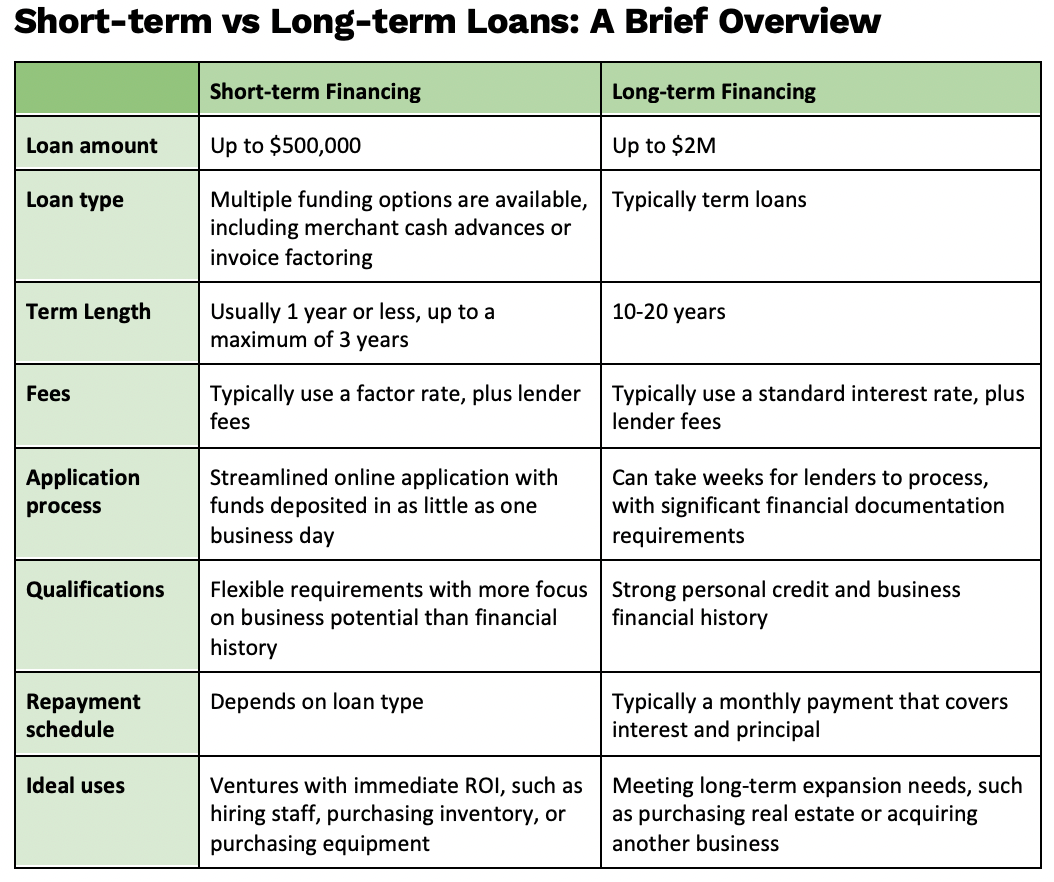Short-term vs. long-term small business funding for medical practices
Between banks, SBA loans, and alternative funding, it can be difficult to choose the funding that best suits your practice’s needs.

Just like many other small businesses, it’s not uncommon for medical practices to rely on financing to expand or grow, cover costs during a low-cash-flow period, or upgrade your equipment or services. But what kind of funding is best for you? Between banks, SBA loans, and alternative funding, it can be difficult to choose the funding that best suits your practice’s needs.
One of the easiest ways to narrow down your options is to determine whether you need short- or long-term financing. In this post, we will explore short term vs. long-term loans for medical practices to help you determine which option is best for your specific situation.
Let’s take a closer look:

When is short-term or long-term financing ideal?
Short-term medical business loans are usually issued for smaller amounts and can typically be acquired more quickly and with less stringent documentation than long-term loans. Short-term small business funding is best used to finance opportunities that have a more immediate return on investment, such as hiring a new staff member or upgrading your practice management software. Short-term financing can also provide a quick infusion of working capital that can help you bridge the gap between insurance payments, invest in marketing your medical practice, or kickstart your growth.
Long-term medical business loans are typically offered for higher amounts and lower rates, making them ideal for large purchases or investments. The approval process takes longer and the requirements are stricter, so you’ll need to be able to demonstrate why you need the money, that it will be put to good use, and how you plan to pay it back. For this reason, long-term small business loans are best used for investing in longer-term ventures that may not have an immediate return on investment, but are necessary for growth, such as purchasing your officespace rather than renting it.
How medical practices can use short- and long-term funding
Medical practices can use both short- and long-term funding for different purposes. Each type of funding is suited to specific purchases or investments, so make sure you select the type of funding that is best suited to the purchase you want to make.
Short-term business loans
Short-term business loans are ideal for smaller expenses that you can act on and pay off quickly, such as:
- Start up costs
- Bridging cash flow gaps
- Purchasing inventory or medical supplies in bulk for a discount
- Covering costs of emergency repairs or other unexpected expenses
- Hiring new employees
- Purchasing equipment, tech, software
- General working capital
- Boosting your marketing
- Improving patient services, such as upgrading your services to include online booking, online paperwork, updated wait times, quick responses to inquiries, free wifi in your waiting room, or extended hours
Long-term business loans
Long-term business loans are typically better suited to large expenses or purchases that you can pay down slowly, including:
- Purchasing real estate
- Acquiring another practice—this is a great way to expand your existing practice or avoid some of the pitfalls of starting your own from scratch.
- Building or renovating facilities
Which type of term loan is right for my medical practice?
The type of funding that’s right for you, whether short-term or long-term funding, depends on multiple factors, such as how quickly you need the money, how much funding you require, what you plan to use your funding for, as well as details important to the lenders, such as your financial history and the financial health of your medical practice.
With over 25 years’ experience in financial services, Pamela Kohl has worked closely with banks, alternative finance, and other fintech platforms to develop core banking services, as well as establish new card programs, lending programs, and global payments platforms. She has been nationally recognized for creating innovative solutions, leveraging new markets, and developing winning strategic partnerships. Currently, Pamela serves as Vice President of Marketing at Greenbox Capital®. Pamela earned a B.A. from Marshall University, summa cum laude, and M.A. in International Economics from the University of Miami, where she graduated with Distinction.
Asset Protection and Financial Planning
December 6th 2021Asset protection attorney and regular Physicians Practice contributor Ike Devji and Anthony Williams, an investment advisor representative and the founder and president of Mosaic Financial Associates, discuss the impact of COVID-19 on high-earner assets and financial planning, impending tax changes, common asset protection and wealth preservation mistakes high earners make, and more.
Is your practice ready for the Trump tariffs?
April 7th 2025Tariffs are set to drive up costs across industries — including health care — impacting everything from medical supplies to retirement accounts. Take a look at the ripple effects on medical practices and some proactive strategies for physicians to stay one step ahead.
Real Estate Transactions for Physician Practice Owners
April 26th 2021Physicians Practice® spoke with Colin Carr, CEO of Carr Realty, to find out what physicians and practice owners should know about real estate trends in early 2021 and the best practices in making commercial healthcare real estate purchases.